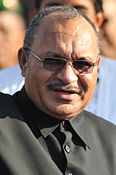Papua New Guinean general election, 2012
|
|
||||||||||||||||||||||
|---|---|---|---|---|---|---|---|---|---|---|---|---|---|---|---|---|---|---|---|---|---|---|
|
||||||||||||||||||||||
|
All 111 seats in the National Parliament of Papua New Guinea |
||||||||||||||||||||||
|
||||||||||||||||||||||
|
||||||||||||||||||||||
A general election was held in Papua New Guinea (PNG) from 23 June to about 13 July 2012, after being postponed by a further week, due to allowing for security personnel to criss-cross the country, particularly the highland provinces. The election also followed controversy over incomplete electoral rolls and the 2011–2012 Papua New Guinean constitutional crisis between the disputed prime ministers of Sir Michael Somare and Peter O'Neill.
In 2011 a dispute arose between Sir Michael Somare and Peter O'Neill over who was the legitimate prime minister. Somare was backed by the Supreme Court, while O'Neill gained the support of a majority of the parliament, the Army and the civil service. O'Neill was internationally recognised as holding the office of prime minister. Both claimants also appointed their own police chiefs and heads of the military. Amidst continuing conflicts, a mutiny occurred in 2012 against factions of the military. There were also accusations of Australian partisanship over Prime Minister Julia Gillard's support for the O'Neill government.
There was a suggestion by the parliament to postpone the election for up to a year in the light of an unprepared process in regards to the implementation of a biometric voting system and an only 60% complete voter roll. Deputy Prime Minister Belden Namah was a proponent of this idea saying the election commission and the census had failed in the count of the population. However, this was decided against by O'Neill who said the United Nations and Australia would step up to support the process. However, he later retracted the comment.
...
Wikipedia


